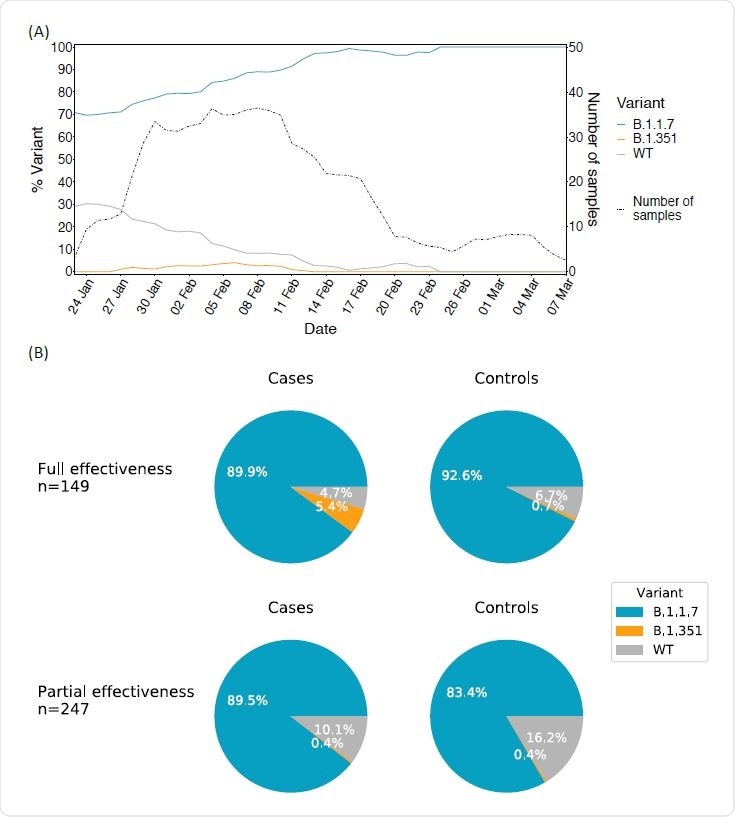The detrimental coronavirus disease 2019 (COVID-19) pandemic, caused by the severe acute respiratory syndrome coronavirus 2 (SARS-CoV-2), has spread worldwide for over a year. Consequently, mass vaccination that is currently underway on a global scale is our first ray of hope that we will soon mitigate this threat.
The Pfizer-BioNTech (BNT162b2) mRNA vaccine has demonstrated relatively high protection levels; nevertheless, there is a worry that several SARS-CoV-2 variants of concerns can overcome vaccine-generated immune defenses.
Moreover, laboratory studies have found a reduction in neutralization properties against the UK (B.1.1.7) and South African (B.1.351) variants. However, the pertinence of these assays in real-life circumstances is still unclear.
On the other hand, T-cell responses not captured by neutralization studies were shown to be relatively stable after vaccination against these variants. Hence, it remains unknown whether variants of concern can cause vaccine breakthroughs in real-world scenarios, where the vaccine gives rise to robust antibody and T-cell responses.
This is why a research group from Israel, led by Dr. Talia Kustin from Tel Aviv University, conducted a case-control study that appraised whether individuals that received Pfizer-BioNTech mRNA vaccine and had a documented SARS-CoV-2 infection were more likely to become infected with the UK and South African variants in comparison with unvaccinated individuals.
A combination of real-world and case-control approach
In this study, the researchers have identified symptomatic or asymptomatic individuals with documented SARS-CoV-2 infection among members of the Clalit Health Services, i.e., the largest health care organization in Israel. Each ‘vaccinee’ was matched with an unvaccinated control with similar demographic traits in order to reduce bias associated with differential exposure.
This was followed by RNA collection from the polymerase chain reaction (PCR) samples and performed complete viral genome sequencing. Subsequently, the paired set of vaccinated and non-vaccinated carriers has been analyzed using a stringent technique of lineage assignment for every viral sequence.
The power of such an approach emanates from the mixture of real-world evaluation and stringent case-control matching strategy, which allowed ruling out a confounding effect as a cause for a high proportion of any given variant.

Variant frequencies of SARS-CoV-2 positive samples. (A) Variant frequencies are shown across the time of the study, including the number of samples collected throughout the study. All values were calculated by averaging over a sliding window of seven days. (B) Breakdown of variant frequencies based on the four groups of this study: pie charts displays the proportion of each variant (B.1.1.7, B.1.351, WT) for paired vaccinated cases versus non-vaccinated controls separated by effectiveness (full effectiveness and partial effectiveness, as defined in the main text), with cases on the left and their associated control on the right.
Variants of concern and vaccine effectiveness
In a nutshell, the results reveal an increased incidence of South African SARS-CoV-2 variant of concern in vaccine breakthrough infections in fully vaccinated individuals and an increased incidence of UK SARS-CoV-2 variant of concern in partially vaccinated ones.
More specifically, in ‘vaccinees’ infected at least one week following the second dose, there was a disproportionally higher infection rate with the South African variant. In comparison, those infected between two weeks after the first dose and one week after the second dose were disproportionally infected by the UK variant.
This suggests diminished vaccine effectiveness against both variants of concern under different timing and dosage conditions. However, the incidence of South African variant in Israel remains low to date, and vaccine effectiveness is still high against the UK strain in fully vaccinated individuals.
Lessons learned
“From a biological point of view, the breakthrough cases observed in this study might either be due to immune evasion of both strains, or the ability of B.1.17 to create higher viral loads”, say study authors in this medRxiv paper.
“Given the low frequency of B.1.351 across time, our results overall suggest that selection does not strongly favor the B.1.351 variant in the particular conditions in Israel”, they further emphasize.
Taking into account the low frequency of South African variant, the researchers suggest that vaccine effectiveness in combination with authorized non-pharmaceutical interventions may be sufficient to prevent its spread and that the UK variant may outcompete the South African one – perhaps due to its established high transmission rate.
In any case, this study underscores the significance of tracking viral variants in a meticulous framework, but also the importance of vaccination which is currently the safest and most efficacious way of preventing the ongoing spread of current (and possible future) SARS-CoV-2 variants of concern.

 This news article was a review of a preliminary scientific report that had not undergone peer-review at the time of publication. Since its initial publication, the scientific report has now been peer reviewed and accepted for publication in a Scientific Journal. Links to the preliminary and peer-reviewed reports are available in the Sources section at the bottom of this article. View Sources
This news article was a review of a preliminary scientific report that had not undergone peer-review at the time of publication. Since its initial publication, the scientific report has now been peer reviewed and accepted for publication in a Scientific Journal. Links to the preliminary and peer-reviewed reports are available in the Sources section at the bottom of this article. View Sources
Journal references:
- Preliminary scientific report.
Kustin, T. et al. (2021). Evidence for increased breakthrough rates of SARS-CoV-2 variants of concern in BNT162b2 mRNA vaccinated individuals. medRxiv. https://doi.org/10.1101/2021.04.06.21254882, https://www.medrxiv.org/content/10.1101/2021.04.06.21254882v1
- Peer reviewed and published scientific report.
Kustin, Talia, Noam Harel, Uriah Finkel, Shay Perchik, Sheri Harari, Maayan Tahor, Itamar Caspi, et al. 2021. “Evidence for Increased Breakthrough Rates of SARS-CoV-2 Variants of Concern in BNT162b2-MRNA-Vaccinated Individuals.” Nature Medicine, June, 1–6. https://doi.org/10.1038/s41591-021-01413-7. https://www.nature.com/articles/s41591-021-01413-7.